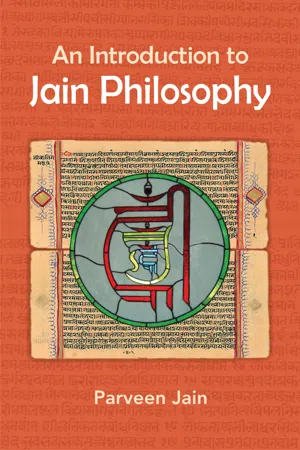
An Introduction to Jain Philosophy
Based on Writings and Discourses by Ācārya Sushil Kumar
- English
- ePUB (mobile friendly)
- Available on iOS & Android
An Introduction to Jain Philosophy
Based on Writings and Discourses by Ācārya Sushil Kumar
About this book
About the Author
Parveen Jain, PhD, is a prolific entrepreneur who has founded and led multiple technology companies in the Silicon Valley. He has ten technology patents, has contributed to over fifty technical publications, and has been recognized with multiple awards for his philanthropic and professional work.
For over thirty years, Dr. Jain has been a leader in the vibrant Jain and Hindu communities of the San Francisco Bay Area. He is an ordained œrÀvaka (householder) disciple of °cÀrya Sushil Kumar (GurujÁ), the source of his religious and spiritual education and the motivation for Dr. Jain's erudition in the Jain tradition. Dr. Jain is deeply involved in the growth of Siddhachalam, the first Jain Tirtha (a pilgrimage, and the abode of enlightened spirituality) outside of India, and considers that, along with leading the effort to build a Jain temple in the San Francisco Bay Area, to be his foremost accomplishment. Inspired by Guruji, he is passionate about applying Jain principles and scriptures to everyday practice for the growing global Jain community and beyond, for current and future generations. About the Book
It is well-known that the Jain tradition has been extremely influential in the development of Indian thought and culture. The Jain tradition teaches that there is an interdependence of perception, knowledge, and conduct unified by an axiomatic principle of non-violence in thought, speech, and action. In this way, non-violence defines the core of the Jain tradition, which has had a profound effect on other dh?rmic traditions originating in India. Jain Dharma is so significant that in some ways it may be incomplete to attempt to understand other Indian traditions (such as Buddhism or Hinduism) without knowing the basics of the Jain tradition, since these other traditions developed in an ongoing dialogue with the insights and wisdom of Jain respondents and visionaries.
This book enables the reader to enjoy a comprehensive journey into the intricate world of Jain thought and culture in a way that is philosophical in its compelling rationality, deeply spiritual in its revelations, yet accessible in its language. The organization of this book allows the reader to engage in an overview of the central teachings of the Jain tradition, but also to ascertain the profundity of its depths. It can be read with equal efficacy in succession from beginning to end, or pursued by individual topics of interest to the reader. Either strategy will have the same effect: a systematic understanding of what the timeless teachings of Jain thinkers have to say about the universal issues of the human condition – and how we might understand our harmonious relationship with other living entities as a powerful and effective spiritual journey.
Frequently asked questions
- Essential is ideal for learners and professionals who enjoy exploring a wide range of subjects. Access the Essential Library with 800,000+ trusted titles and best-sellers across business, personal growth, and the humanities. Includes unlimited reading time and Standard Read Aloud voice.
- Complete: Perfect for advanced learners and researchers needing full, unrestricted access. Unlock 1.4M+ books across hundreds of subjects, including academic and specialized titles. The Complete Plan also includes advanced features like Premium Read Aloud and Research Assistant.
Please note we cannot support devices running on iOS 13 and Android 7 or earlier. Learn more about using the app.
Information
(Jain Dharma kā Svarūpa)
Table of contents
- Title Page
- Contents
- Ācārya Sushil Kumar
- Foreword
- Prologue
- Preface
- Acknowledgments
- Editor’s Note
- Scheme of Transliteration
- 1. Characteristics of Jain Dharma (Jain Dharma kā Svarūpa)
- 2. A Glimpse into the Past (Atīta kī Jhalaka)
- 3. Path to Salvation – Right Perception (Mukti-Mārga – Samyag-Darśana)
- 4. Right Knowledge (Samyag-Jñāna)
- 5. Analysis of the Universe (Viśva kā Viśleṣaṇa)
- 6. The Discussion of the Fundamental Truth (Tattva-Carcā)
- 7. Fundamental Doctrines:Nayavāda, Anekāntavāda, and Syādvāda
- 8. Jain Psychology (Manovijñāna)
- 9. Jain Yoga: Meditation and Union with Divinity
- 10. Spiritual Progression (Ādhyātmika Utkrānti)
- 11. Doctrine of Karma (Karmavāda)
- 12. Right Conduct and Doctrine of Ethics (Samyag-Cāritra and Nītiśāstra)
- 13. The Virtues of Jain Mendicants (Nirgrantha Dharma)
- 14. The Lineage of Jain Dharma (Jain Dharma kī Paramparā)
- 15. Summary of the Distinct Merits of Jain Dharma
- Appendix: Jain Mantras
- Glossary of Terms
- Bibliography
- Index